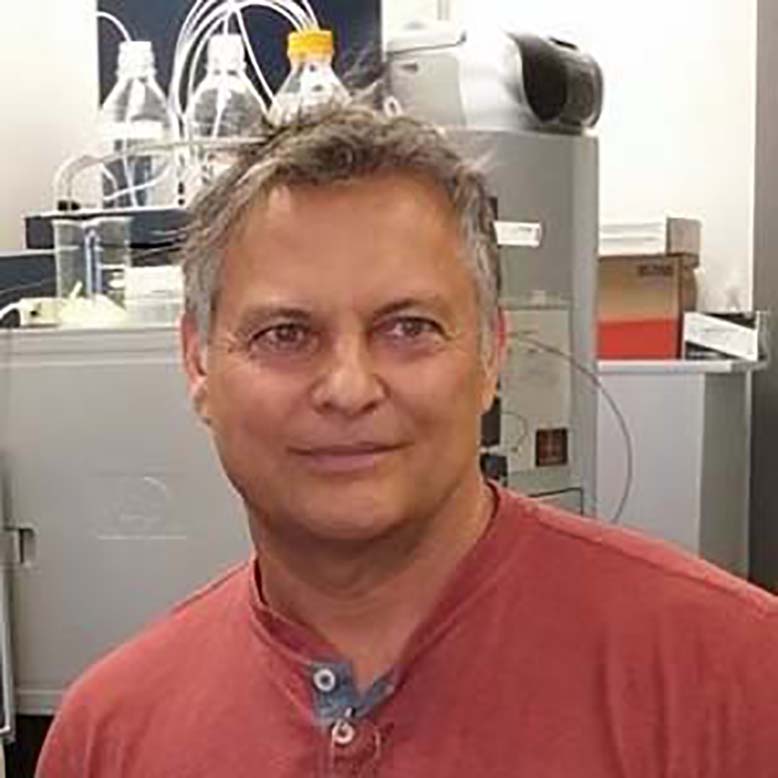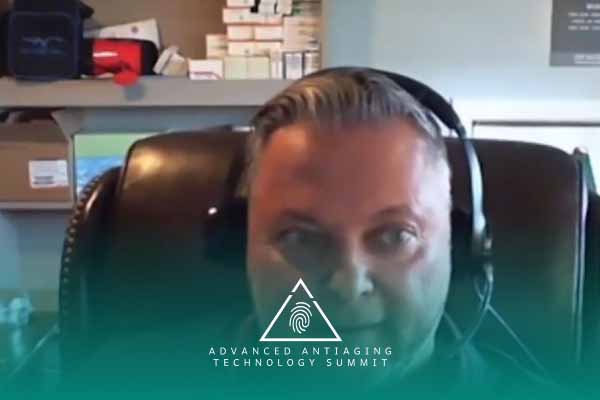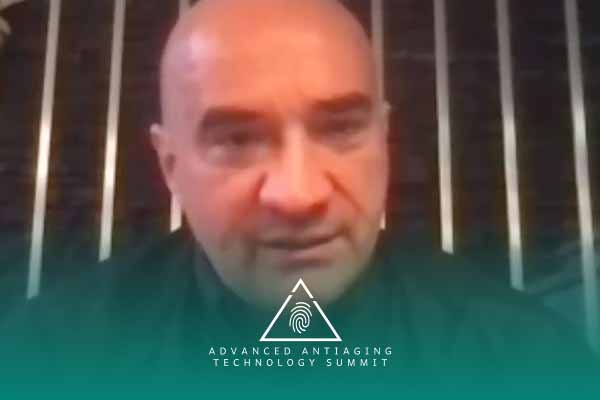Join the discussion below

Dr. Goel is a medical physician and founder of Peak Human Labs. His mission is to speak knowledge of the latest cutting edge medical tools and science in order more people to live in a Peak mental, physical and spiritual state. You can learn more about his work at longevity.peakhuman.ca. Read More

Jean-Francois Tremblay, MD, CM, FRCPC, FAACS
Jean-Francois did his undergraduate studies in Biochemistry, Mechanical engineering and Kinesiology. He then pursued his graduate studies in pharmacy to finally complete a master degree in pharmacology. His interest in peptides and their applications started over 20 years ago. He has consulted privately since then for anti/healthy aging, sport performance... Read More
Sanjeev Goel, MD, FCFP (PC), CAFCI
Hi everyone, I’m Dr. Sanjeev Goel and today you’re listening to the advanced anti-aging and technology summit. I have John Francois Trembley with me. He’s an expert in peptides. Welcome John Francois. How are you?
Jean-Francois Tremblay, MD, CM, FRCPC, FAACS
I’m very good and thank you for having me today. I’m so glad that you took the time today and we couldn’t talk about anti-aging without talking about the whole world of peptides and and you’re an expert in that field. Let me just take, take the listeners on a little bit of a bio I have of you. So, John Francois did his undergraduate studies in Biochem Mechanical Engineering and Kinesiology
Sanjeev Goel, MD, FCFP (PC), CAFCI
Out of which I graduated in Kinesiology And I did study those things, but like I didn’t get a degree of everything.
Jean-Francois Tremblay, MD, CM, FRCPC, FAACS
Okay, good.
Sanjeev Goel, MD, FCFP (PC), CAFCI
Well then you did do, pursue You did get a graduate degree in Pharmacy to complete a Master’s degree in Pharmacology.
Jean-Francois Tremblay, MD, CM, FRCPC, FAACS
That’s right.
Sanjeev Goel, MD, FCFP (PC), CAFCI
Right. And then you, your interest in peptides and their application started over 20 years ago. So, really some time ago, he is you’ve consulted privately since then for health, anti-aging, sport performance and general health. And then you started a company that makes peptides called CanLab. Is that right?
Jean-Francois Tremblay, MD, CM, FRCPC, FAACS
About, six years ago. That’s right. That’s about it, yeah.
Sanjeev Goel, MD, FCFP (PC), CAFCI
Okay, so maybe, just, I’d love just for the viewers to understand, I know some of the viewers understand what peptides are, but just in general, you know, what are peptides? That would be great if we could start with that.
Jean-Francois Tremblay, MD, CM, FRCPC, FAACS
Well, very easy. They’re a small chains of amino acids, basically. So it starts, as, you know you have single amino acids, you hook together two. That’s not that tight. Officially, it can be up to 50 amino acids. Then it becomes a small protein. But you know, there is a gray area which may incident for example, it’s, it’s a peptidic structure but because it’s not longer than 50 they call it a small protein or a growth hormone. The same, it has a peptidic structure, but it’s bigger than 50. So, you know, it’s in that gray area. So basically this is it. And the other way around, let’s say you eat meat you will digest it down to small protein which will be digested down to peptides. And then to amino acids that will reach your tissues and and everything.
Sanjeev Goel, MD, FCFP (PC), CAFCI
Just now that you’re just saying that, I’ve had a question. So ,do people get these peptides like various peptides even these, these ones from diet, like can be people can body make some of these peptides?
Jean-Francois Tremblay, MD, CM, FRCPC, FAACS
Both, actually, some come from the diet. Think of a collagen. Peptides, you know the collagen protein is met, is made of specific peptides. Now the million dollar question is, you know, since they are digested, when you take them orally, then what’s the point of taking them orally since they are going to be like just a down to amino acids. And that specific peptide structure would be lost. Well, it’s not the case, you know, digestion is not perfect. So, there is always a percentage of it that will make it through the bloodstream, which make collagen peptide work because yeah, a lot of the, the actual structure that is good for collagen in your own tissues they won’t make it, but some of it will, and there will be an effect.
Plus, I think it has to do with some specific miti on the end that’s really rich or it’s good. But basically yes. And, that’s what I believe where the, if, you know that’s not written anywhere, but what I think in the evolution of man, I think that’s kind of how peptides where discovered, you know, that, okay every organ produce peptides to bioregulate that organ. So the heart, for example has a very small peptide, that it will secrete and it will have an effect on the…
Sanjeev Goel, MD, FCFP (PC), CAFCI
Even the heart cells? Like the heart cells are producing peptides?
Jean-Francois Tremblay, MD, CM, FRCPC, FAACS
Yeah, yeah, they are produced in the tissue that regulates that and help to regulate that tissue. So, for some reason, people probably would be more sensitive but you know, that whole shabang of, you know if you want courage, you eat the heart of the animal or if you want intelligence you eat the brain. Well it turns out that, where did that come from? Well, probably, you know, long, long time ago, ancestors they would eat all the organs of the animals. And you know they would eat their heart and probably felt something. Probably, you know they were more sensitive because they were eating the peptide that’s good for their heart or for the liver or for this. And you know, it kind of directed them to, okay if I have a liver problem but I eat liver it’s going to improve plus, you know all the B vitamins you get and all that.
But, so probably that’s kind of how it started and, you know finally broad science to look, okay let’s look at those organs. Let’s look at peptides. And yeah, they found, and there is a whole bunch of which we called the bio regulator peptides that are very specific to organs and they worked like adaptogen to those organs. So if something is too high, it’s going to bring it down. If it’s too low, it’s going to bring it up just to bring it to the optimal level. So you have for the heart, the liver, the brain pretty much everything because probably every organ has one we didn’t discover them all. So, yeah. To come back to your question. So some of it is really absorbable to different degrees.
Sanjeev Goel, MD, FCFP (PC), CAFCI
Right? So some of it’s getting absorbed and whatever whatever’s not getting absorbed. A lot of these peptides could be made made by the different organs from the individual amino acids. Is that correct?
Jean-Francois Tremblay, MD, CM, FRCPC, FAACS
Yeah, yeah Yeah. We’re programmed to make those I actually, all natural peptides, not all, I’m lying here. Most that we know about, we make them in our own body, think of BPC-157 Thiamizine, Betefour, we make them already. So, either because of aging, we produce less or any other reason, we don’t have enough. Then by taking it, we just add to the pool of what’s there already, we made them all there is a few now that have been discovered in plants that have effects in humans but I would say 98% or more, we make them already. And many times the condition of the people is due to for some reason, a lack of that peptide, you know we don’t make as much anymore. So we get that condition, the disease, or like -That’s the part of the aging, that’s the aging process. You were saying that as we’re getting older we’re making less of these peptides.
Sanjeev Goel, MD, FCFP (PC), CAFCI
Yeah. Which is…
Jean-Francois Tremblay, MD, CM, FRCPC, FAACS
Yeah, and we are programmed to die. So, you know, it will happen to everybody. I think it’s part to produce less of those. It’s part of that, all mechanism of dying, you know, we will all die one day Virus or no virus.
Sanjeev Goel, MD, FCFP (PC), CAFCI
That’s why. Okay. Well, we’re trying to starve it off a little bit with this summit to help people.
Jean-Francois Tremblay, MD, CM, FRCPC, FAACS
Well no, no and it is feasible. And, for many, many years, well my belief of anti aging it’s a bit raw, but you know, nature is cruel so the day you cannot reproduce you become useless for nature. Basically, what’s the point. So, not that you’re gonna die the next day but all those mechanism that brings about that kick in…
Sanjeev Goel, MD, FCFP (PC), CAFCI
Start, right.
Jean-Francois Tremblay, MD, CM, FRCPC, FAACS
and then you’ll have slowly that degradation of things. So, and you can have the best diet. You can train and exercise. Yeah. It’s going to improve your quality of life but those mechanisms they kicked in and you will die. So the only way to slow down those processes those processes is to tweak with your own biochemistry that you know you cannot do it because everything that made you strong when you were younger diet, exercise, everything. Now it’s actually it’s playing against you because not all the signaling is okay this one has to go, you know, so it’s happening. So if you tweak with your biochemistry then you can slow it down. And up to a point, you know we don’t see nobody living 200 years yet. And just by tweaking with biochemistry I don’t see it happen to that extent but you can look at the 30, 40, 50 years more than the average 80 years we have now you know, life expectancy.
Sanjeev Goel, MD, FCFP (PC), CAFCI
So adding like 30, 40, 50 years, you’re saying.
Jean-Francois Tremblay, MD, CM, FRCPC, FAACS
Yeah, to 80 years. But again, there is so, so, so many factors that are literally out of our control, that’s in the perfect world but I think you can add, 10 to 30 years. Taking care of with a good life.
Sanjeev Goel, MD, FCFP (PC), CAFCI
Yeah. Maybe let’s just talk a little bit, I know you mentioned kind of mentioned Russia a little bit. Can you tell a little bit of history of why why this science seems to come more from, from Russia?
Jean-Francois Tremblay, MD, CM, FRCPC, FAACS
Well, it was kind of an accident in the sense that one of the first peptide that was investigated, initially it wasn’t for anti aging. It’s a pentanol. A lot of people had heard about it, Dr. Kevenson in Russia, back in the eighties discovered it but the purpose wasn’t anti-aging when they started to look into it, you know he was a medical doctor in the army and you know the Cold war and all that same in the U.S. same in every country, they hire doctors and they say, look find something to make our soldiers better at everything. And so he started to look into peptides and came across a pentanol And then he said, okay, yeah that could you know be good for soldiers, but hey, look at this I give it to some mice and they live longer and they live healthier and whoa. So bang, that’s kind of how it started and it turns out that it was in Russia. They looked into it while in the U.S. I don’t know they looked into other things and probably Canada they looked into other things, you know every country I think has its own thing happening. And the Russians, they decided to look into peptides and it’s kind of a how it started.
Sanjeev Goel, MD, FCFP (PC), CAFCI
Oh, okay. Right, right. Okay. And so the, let’s say something like maybe let’s just talk about Epithalon. Because it’s one of the more popular peptides. What is, what is your feeling on how this is working and what, what can one expect by taking this?
Jean-Francois Tremblay, MD, CM, FRCPC, FAACS
Okay. Epitalon is one of those bio regulators I mentioned at the beginning we produce it naturally when it’s naturally produced it’s called a Epithalamin. Epitalon is the synthetic version but the molecule are exactly the same. It’s produced by the pineal gland as is melatonin, you know so basically it’s known as now a day as the anti-aging peptide because it might or might not. That’s the only thing, I’m not a hundred percent sure because when they did those studies on telomere lengthening I’m not sure the techniques to measure were that good?
So, maybe yes, maybe no but when you look at what everything else it does and that is proven in human studies, then the telomere thing is kind of a secondary but the most in term of a life expectancy what you can retain from taking it is they they gave it to people between 60 and 78 years old. And the most amazing part is, you know they were a six, 10, 12 years long study but they didn’t give it during that whole length of time You know, it was given twice a year, but only for two, three years at the beginning, then they let them go. And 10 years after they look, it wasn’t taken for 10 years twice a year, only for a few years at the beginning. And then, and what they notice is a decrease in mortality and the group was taking it up to a 67%. So, two thirds of less people died in the group who took it then in the group who didn’t and and then they didn’t look further to see, okay do they really live longer? We don’t know, but yeah, we can…
Sanjeev Goel, MD, FCFP (PC), CAFCI
Interesting, so the dosage, I mean, they gave bigger dosage, I believe. Right. In, in those, in those studies, is that correct?
Jean-Francois Tremblay, MD, CM, FRCPC, FAACS
No, a hundred milligrams total, twice a week Sometimes 50 milligrams, twice a year.
Sanjeev Goel, MD, FCFP (PC), CAFCI
A hundred milligrams, a hundred milligrams.
Jean-Francois Tremblay, MD, CM, FRCPC, FAACS
Total
Sanjeev Goel, MD, FCFP (PC), CAFCI
Twice a week. Total
Jean-Francois Tremblay, MD, CM, FRCPC, FAACS
No sorry. Twice a year
Sanjeev Goel, MD, FCFP (PC), CAFCI
Oh, twice a year. So, at a hundred milligrams. And was it given all at one time or …
Jean-Francois Tremblay, MD, CM, FRCPC, FAACS
In some study it was 10 milligrams a day for 10 days, other studies it was 10 milligrams every three days for a total effect. You know, they tweaked with a few protocols. So it was either 50 milligrams, total or a 100 milligrams and spread out over 10 to 30 days. But they all gave about the same results. What seems to be the most important is the total amount that was taken.
Sanjeev Goel, MD, FCFP (PC), CAFCI
So at that CanLab, those interested, Canlab.net. You sell each vile for how many milligrams in a vile?
Jean-Francois Tremblay, MD, CM, FRCPC, FAACS
A hundred.
Sanjeev Goel, MD, FCFP (PC), CAFCI
just so people can understand.
A hundred miligrams
Jean-Francois Tremblay, MD, CM, FRCPC, FAACS
Which would be the total to be taken the highest dosage to be taken twice a year.
Sanjeev Goel, MD, FCFP (PC), CAFCI
Okay. It’d be given intravenous as well I assume.
Jean-Francois Tremblay, MD, CM, FRCPC, FAACS
You could, but I don’t see the point. Sub-Q, you know it reaches because its water soluble, reaches the bloodstream in seconds and the advantage of actually IV is that if you don’t want it to reach all the blood stream at once, you know, you drip it. So, you know, you have that bag of 250 CC. The peptides is in there. So you get to bed. If she took the drip over three hours then you’re given the peptide over three hours. When you do Sub-Q you get the full dose at once.
Sanjeev Goel, MD, FCFP (PC), CAFCI
Okay. Is there any advantage of wanting to do it slowly? I’m just, even for other peptides is there any ever advantage of doing it slowly?
Jean-Francois Tremblay, MD, CM, FRCPC, FAACS
There are short acting ones you may but then you would be looking at, okay, I’m looking at thinking of like Thymosin alpha one, in serious cases It’s very short-lived maybe a couple of hours. So, if you have a very serious condition then you would want either multiple shots like four to eight shots, a day of small quantities or a very long drip to get a better effect. There is another one it’s oh, OGF. It’s a very potent anticancer peptide but it’s very poorly absorbed.
So you need to give very small quantities to be absorbed so long drip permits that so you know if you shoot it all a lot will be thrown away. But if you have a slow drip then most of it will be absorbed. So it’s very specific cases and therapeutic cases where you would look into a drip. Otherwise, there is no I don’t see much of a difference practically. It could be more practical if the person was to get a drip anyway, so throw in the peptide in So you avoid that person a bunch of injections, but otherwise, no I don’t see clear advantages of, on the IV.
Sanjeev Goel, MD, FCFP (PC), CAFCI
Right, okay. So let’s move right to Thymosin alpha you know this is one of the main state peptides I’ve seen. I was, you know, I guess it basically, maybe perhaps balances the immune system. How would you describe how this peptide works?
Jean-Francois Tremblay, MD, CM, FRCPC, FAACS
That I’ve learned from Dr. C actually, One of its effects, that’s why it’s so good at cancer in cancer therapy. The way that Dr C explained it is when you have a cancer the cancer cell build up kind of a shield around themselves that makes them invisible to your own immune system. So, eh, I, I didn’t see the study on that, but you know I trust them on, on that. It seems that Thymosin alpha one breaks down that shield. So it makes the cancer cell visible to your own immune system. So it become immunotherapy, plus it I wouldn’t say it strengthen the immune system. It will strengthen it if it needs to be strengthened. You know, you have that balance of TH1 and TH2 what it will do is just re stablish that balance so it will bring your immune system where it should be to do what it’s supposed to do. So it’s like a two, a one stone to burn where and in cancer cases where you strengthen the immune system if you want to use that word and make the cancerous cells visible to your immune system. So it becomes a great tool and a cancer fighting.
Sanjeev Goel, MD, FCFP (PC), CAFCI
I think that Thymosin alpha has been like as a since some form approved for like hepatitis treatment or something, or
Jean-Francois Tremblay, MD, CM, FRCPC, FAACS
Yeah. B and C, it’s actually approved for it. But it is B, but it is C when company that pharmaceutically markets it get a patent on the bunch of applications. Yeah. It’s a that’s a huge tendency we see in the peptide world today, you know you have all those new peptides that popped out and peptides for this and inflammation and all that. And they’re very targeted, which could be a good thing. But at the same time, you know you have Thymosin Beta four you have Thymosin alpha one were derivative from a Thymic protein. And then you have BPC-157 which is a derivative from a stomach, it’s by the stomach lining protein, it’s a fraction of that protein.
And those three, they pretty much cover it all in terms of healing and re-establishing and then you have those new, you know there is that concept of reinventing the wheel, so you know you have those great things that are working and then they’re kind of forgotten because those new things came up. But you know, that works fine, you know you don’t have to break your head, finding one specific peptide for one very specific application. You know Thymosin alpha one, Beta 4 and BPC I like to call them… Standard almost more improved peptides. That for a practitioner who doesn’t know about peptide he could give those three and not knowing what it is doing or not even sure about the condition of his client and probably in 80%, 90% he would see improvement Just right off the bat probably would see more improvement if he knew about it in terms of dosages and combination and ratios and all that but he could just throw them and that’s what they’ve been doing for a few years actually I’ve consulted with a bunch of doctors professional consults where I would teach them that and right off the back, they would tell them, look I’ve been prescribing them for months and I have no clue of what I am doing I want to learn, but they’ve been doing and they had good results.
We thought side effects, we thought you know nobody calling them at four in the morning from the emergency, no that doesn’t happen and then you see all those new ones popping, like for inflammation, for this, for that they have their place but its, to me it’s very, very therapeutic and to a very small percentage of applications That’s why, to come back to anti-aging I’m coming back myself to those bio regulators and to those three, microdose or small dosages year round and you cover everything you know you mentioned Met-C yeah, when we age, Met-C goes down. So, your reflex would be, okay let’s take Met-C you know to bring it up…
Sanjeev Goel, MD, FCFP (PC), CAFCI
Right.
Jean-Francois Tremblay, MD, CM, FRCPC, FAACS
Yeah, but if you have a sound bio regulator protocol not only a pentanol, there is maybe 25 of them where around, you, up regulate, assuming that everything was going down all of your organs and system it is not because there is know study showing it that it’s not happening and I suspect that it is happening you know if most probably your natural Met-C level will go up you know if everything else go up, this one Met-C was discovered recently so nobody did any study on bio regulators and Met-C levels but you know an educated guess, is well if everything improved, chances are, this will improve too so you don’t need to take the Met-C in a preventive way you know you just work around those bio regulators up regulate everything and why do you think people, you see such a huge decrease in mortality with one peptide taken the way it was taken, like not much actually and you can expect all, to have all those other bio regulators to have such a profound effect you know why look so far, when it’s there already You know that Russian guy, he really put his finger on something when he discovered those and…
Sanjeev Goel, MD, FCFP (PC), CAFCI
So what other bio regulators are there? Just so I can understand, what are the names of some other bio regulators?
Jean-Francois Tremblay, MD, CM, FRCPC, FAACS
Okay, for the liver, its livegen for the heart its cardigan pancreas, pancreagen you know they kind of use the name of the organ for the brain its Pinealon brain and nervous system, testagen for the testicles and the man’s reproductive system There is about…
Sanjeev Goel, MD, FCFP (PC), CAFCI
Are these all related? Like on a chemical structure do these all look very similar?
Jean-Francois Tremblay, MD, CM, FRCPC, FAACS
Two, three, four amino acid, sometime it’s the same amino acid but in a different order. Yeah. They’re very related. Very close. And it turns out that, and it’s that funny thing Carla already pinpointed last year. And I, I agree fully. It seems that the smaller, the peptide the more profound effect it has and what we know specifically about the bio regulator why are they so potent? Is that their actual receptor, if you could call it that when that case it’s the DNA chain, you know they penetrate the cell, they penetrated the nucleus and they go in the DNA chain, attached themselves there to kind of dilate it in that spot which increases the expression of the genes in that area. You know, it’s a pitch they take and they score. You know you go straight to the DNA to increase the expression of those positive genes.
Sanjeev Goel, MD, FCFP (PC), CAFCI
Right. . And what’s interesting too, is people. And I include myself. We always add that pinpointed view of, okay you look for the heart, you take cardigen for the liver you take this, but now I’m rereading, all the studies you’ know it’s like the Bible, you know every time you read it, you’ll find something new.
Jean-Francois Tremblay, MD, CM, FRCPC, FAACS
So it turns out, our studies Where they look at, I don’t know, right off my head I don’t know which one, but they look at this peptide that’s supposed to be for the liver but then this study they look at its effect on the brain. So yes, they have an effect on the organ where it comes from, but it has a systemic effect too. So by taking a combination of two, maybe six eight per year, you’ll cover pretty much everything. And, and in term of healing that’s why with a bit of TA one, TB4, BPC. So, you repair everything as it breaks down. I think you’re pretty much peptide wise, you have a very sound program with that.
Sanjeev Goel, MD, FCFP (PC), CAFCI
Is there like the 3d shape of these peptides? Does that change depending on whose like how it’s this, I’m sure this…
Jean-Francois Tremblay, MD, CM, FRCPC, FAACS
No.
Sanjeev Goel, MD, FCFP (PC), CAFCI
Or it doesn’t really matter?
Jean-Francois Tremblay, MD, CM, FRCPC, FAACS
No, no
There is too small, too, other than that, to have a real 3D, well they do have a 3D? structure, but you know it’s no they’re too small to fold upon them themselves. Or, you know, to, to, let’s say to go straight up and link, no they’re, they’re too small for that. They’re pretty solid in that sense, you know, they they don’t change much design.
Sanjeev Goel, MD, FCFP (PC), CAFCI
Is there enzymes that, that create these peptides like that we can, we can support in other other ways like our own production of BPC. What’s that dependent on? Is there some type of like to create, you know two amino acids to come together? A couple of amino acids? No, I don’t think so.
Jean-Francois Tremblay, MD, CM, FRCPC, FAACS
Well there is, but actually that, that’s an amazing point. Nobody thought about that yet. You know, I see your point. You know, instead of taking BPC let’s stimulate our own production. I have no clue about that.
Sanjeev Goel, MD, FCFP (PC), CAFCI
Interesting. But so our viewers, I mean one can’t overdose on peptides, but these are naturally occurring…
Jean-Francois Tremblay, MD, CM, FRCPC, FAACS
Well, some of them, you can actually, it’s not gonna kill you but it’s going to make you feel really, really, really bad. But, and, and we’re talking very specific peptides Bio regulators you cannot overdose.
Sanjeev Goel, MD, FCFP (PC), CAFCI
Right.
Jean-Francois Tremblay, MD, CM, FRCPC, FAACS
Those three main ones because there are the mostly used BPC-157, Thymosin beta 4 and alpha one, some people react to them because of their condition. Let’s say they have autoimmune condition. Then you know, it’s it’s a very fine line between side effects from the compound and just an effect from your condition. I always use the example. Let’s say you are allergic to peanuts, right? And you eat peanuts. You’re going to get really bad but nobody’s going to say that it’s a side effect from the peanuts, no peanuts, don’t have side effects. It’s your condition. That brings about that reaction to peanuts. And I see the same thing with peptides. They all occur naturally. So now, if you have a reaction to them, it’s more due to your own condition than to a natural side effect. But of course, for the, the, the the person taking it, that’s the same thing. They feel bad but it’s very small cases And that’s why when you are treating a condition with peptides it’s it’s always good to, to do it under medical supervision. And sometimes it can be really bad like, better have some Benadryl, not too far I’ve seen very, very bad reactions.
Sanjeev Goel, MD, FCFP (PC), CAFCI
Oh, wow.
Jean-Francois Tremblay, MD, CM, FRCPC, FAACS
Okay. So I think that that’s an important thing for our viewers to take back is that, you know, at least be under the guidance of somebody who knows what they’re doing. And these do sit in a bit of a gray zone a bit, I guess… And, and for many reason, not for that you know health wise, if you a condition, go see a practitioner because otherwise it’s going to be shots in the dark you could get bad reactions. And, and you know, they’re not cheap. So, you know, you want to get really the most out of it as you can. And that can be done under a knowledgeable practitioner.
Sanjeev Goel, MD, FCFP (PC), CAFCI
Okay. And then, I mean, I, the pancreagen and maybe let’s just chat about that really quickly. Have you seen what’s the results you’ve seen with that? I’ve tried on. I think some of my patients have taken that
Jean-Francois Tremblay, MD, CM, FRCPC, FAACS
Pancreagen, there was one study in Russian where with, to mice, the first, they induced diabetes type one with the drug, it’s called Alloxen it kills all the Beta cells in the pancreas, full-fledged diabetic type one. And then they start to measure the blood glucose of course, the next day up the roof, both groups. And then they gave two courses to one group of Pancreagen And within a month, the mice who received the Pancreagen the blood glucose was back to normal because it was in Russian and kind of expensive. I didn’t get the whole thing translated just those results.
I don’t know if they look, if they did biopsies of the pancreas to see if there was a regeneration or not of those beta cells, probably something happened because blood glucose was related back to normal within a month. I’ve personally, I haven’t seen it yet but lately the couple of people have diabetes type one. We started to use it and tending to see, and, you know they monitor their blood glucose every day. They’re taking notes and all that. So I’m expecting those results. We will publish make them public that published because you know, it’s not peer reviews and all that but at least to see numbers of, okay this is what that’s what happened.
Sanjeev Goel, MD, FCFP (PC), CAFCI
So, oh yeah. I’m looking forward to that.
Jean-Francois Tremblay, MD, CM, FRCPC, FAACS
That would be game changer. We can it such a common condition… Well from that study it is a game changer, but I haven’t seen it in practice yet to tell the truth. And I wish I did. Haven’t
Sanjeev Goel, MD, FCFP (PC), CAFCI
Okay. What, what are you looking forward to? Like, what do you think the next year is going to hold with regards to peptides and and what do you think is going to happen?
Jean-Francois Tremblay, MD, CM, FRCPC, FAACS
Shifting legislations? That’s what You know, it’s a few doctors. I talked to Dr. Alter. If I remember before the podcast I did with him he asked me the same questions. You know where do you see, basically you said my future in the next five years and being in the U.S. and all that, I said, well, I said start to look for a, an office in the Caribbean’s. If you want to keep practicing with peptides the same with stem cells, what we saw a few years ago people were doing it now, you know you go see a doctor in the U.S. right and can And I was surprised, you know a lot of doctors that you wouldn’t think and the first thing you you’ll notice. So yeah, you do have an office in Mexico and an office here you know, they have their practice in the U.S. And at one point they tell our client this, okay now the next step, a next appointment.
That’s there, it’s in Mexico. And nowhere I’m going to meet in Mexico because they cannot do it in the U.S. anymore. And, and I see that crawling up in the North America. It’s, it’s not quite the answer, the question you asked me but that’s what is, it’s moving to work and it’s too bad because right now we’re in between we’re in that phase where it’s almost mainstream you know, that, that the, the interest in them is booming. And when it’s going to be there and you know then it’s going to be shut down. But that’s what they say. It was the same in sport. You’re not about supplements and all that. You know, I worked with high level athletes back in my years. And we always said that, you know, if you want to know if a supplement works well, is it banned? Yes. So that means it works.
Sanjeev Goel, MD, FCFP (PC), CAFCI
So that’s the main tendency.
Yeah. Okay. Yeah. I think that’s, that’s awesome. Any, want to just let the viewers know where they can go. If they want to get some peptides and I can say it…
Jean-Francois Tremblay, MD, CM, FRCPC, FAACS
Well, we sell peptide for research purposes for legal reasons. So we do have a web store. We don’t give indication. We can’t, you know, say I get so many emails. No, no, no. We cannot give dosages or anything. That that would be a prescription. We can’t, we can sell them as research for your personal research. You do what you see fit with them, but we really really cannot give indications on that. At CanLab research, if you type CanLab for research not our site it’s CanLab science that come but if you type CanLab research that that’s gonna pop up and the link CanLab science and you can get them there
CanLabscience.com.
Sanjeev Goel, MD, FCFP (PC), CAFCI
Yep.
Jean-Francois Tremblay, MD, CM, FRCPC, FAACS
That’s correct? And we’re expanding our line of peptides. Again, they are very pinpointed peptides. Don’t be scared by the quantity of peptides we’re selling Again, to go back to anti-aging. You can bring it down to on the year round protocol of maybe six to 10 peptides, but again not to be taken all the times, those buyer regulators they all follow pretty much the same rule twice a year 50 to 100 miligrams and you’re set.
Sanjeev Goel, MD, FCFP (PC), CAFCI
Yeah. Okay. So that’s good for any of any of the by regulators you’re suggesting is that do this once or twice a year, and then, and that’s it.
Jean-Francois Tremblay, MD, CM, FRCPC, FAACS
Yeah I’m gonna write something soon. You know, there is a few good groups on, on Facebook private groups that they talk a lot of, I write there. I, you know, I put out information that I cannot, so publicly so I’ll send you the link. If you want to give it to your listeners they can go in that group ask questions, you know, search things. And I do little informational podcast on the in one of those groups in particular. And they can get good indications there because I believe even though there is 25 peptides because of those general interactions, I you can simmer it down to maybe six bio regulators that your take twice a year. And then those three peptides, I mentioned BPC, TB4 and Thymosin alpha 1 kind of micro dosing year around or, you know, do periods with short breaks. And, and I think peptide wise, you would be like very well covered the in term of..
Sanjeev Goel, MD, FCFP (PC), CAFCI
All right. Thank you so much, Dr. Jean Francois
Jean-Francois Tremblay, MD, CM, FRCPC, FAACS
I’m not a doctor, I’m a master.
You can call me, master, master degree, call me master
Sanjeev Goel, MD, FCFP (PC), CAFCI
Well your like a doctor.
Jean-Francois Tremblay, MD, CM, FRCPC, FAACS
Well thank you again for having me. It was very nice.
Sanjeev Goel, MD, FCFP (PC), CAFCI
All right, thanks.
Downloads










